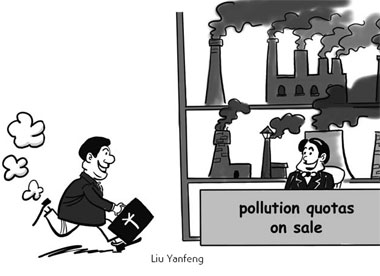Japan's business sector facing up to climate threat
(China Daily)
Updated: 2008-03-04 07:27
Updated: 2008-03-04 07:27
Encouraging signs have emerged that Japan's business community is changing its posture toward the global challenge of stemming harmful climate change.
The business community is finally displaying a willingness to discuss whether Japan should introduce a program for trading in permits to emit the greenhouse gases that cause global warming. Until now, there has been strong opposition to this idea among Japanese companies.
Such a program would allocate tradable emission permits or allowances - the right to emit a specific amount of greenhouse gasses - to companies or other groups, allowing them to buy or sell such allowances, depending on whether they have a shortage or a surplus.

The government has set up a new advisory panel on global warming that comprises industry representatives among others. The issue of emissions trading will undoubtedly be the major topic for the panel, which will start holding meetings this month.
We welcome the change in the corporate sector's stance toward the issue. A new era is now dawning. Companies can no longer emit huge amounts of carbon dioxide freely.
The business community's move comes on the heels of many years of international scientific research that highlighted the consequences of global warming caused by humans. The grim findings were included in a series of reports released by the Intergovernmental Panel on Climate Change, a United Nations -sponsored scientific body that was awarded the 2007 Nobel Peace Prize.
Stemming global warming has emerged as one of the two biggest security challenges facing the world. The other is preventing conflicts that engulf nations.
Emissions trading represents a fairly flexible approach to tackling the challenge. This approach is designed to curb CO2 emissions through a market-based mechanism instead of punishing polluters who exceed their quota.
There are various types of programs. One allocates emission allowances to sources of greenhouse gas emissions, such as factories and power plants. Another, an "upstream" program applies to fuel distributors, such as oil wholesalers.
There are also two different ways to allocate allowances. One is to distribute free allowances to installations according to their past emission records, while the other is to auction them.
If allowances are allocated to factories and other institutions for free, the process must be handled wisely to ensure equitable distribution. Otherwise, the program could end up disadvantaging companies that have already reduced their emissions substantially or allowing emitters to earn profits by selling their allowances without making serious efforts to cut their emissions.
The European Union's emissions trading system, which was introduced in 2005, is a downstream program applied to sources of greenhouse gas emissions. Most of the emission allowances are given away for free. As flaws with this system have become clear, the EU is now considering auctioning a larger portion of the allowances from 2013.
In the United States, where political momentum for emissions trading is growing within the Congress and some individual states, upstream programs have been proposed by certain authorities. An upstream program imposes caps on emissions from the suppliers of fuels. But it cannot place pressure of an emissions quota on companies to adopt energy-efficient technologies.
Emissions trading is now beginning to spread from Europe to other parts of the world. What is important now is to weigh the advantages and disadvantages of different types of this approach to figure out a fair and effective formula.
In January, Prime Minister Yasuo Fukuda declared that Japan will adopt a specific target for slashing its greenhouse emissions. That means Japan has agreed to the distribution of emission permits based on a cap on global emissions to individual countries.
What the government should do next is to draw up a framework to distribute allowances based on a cap on Japan's emissions to individual industries and businesses to ensure that they will make their own efforts to achieve their emission targets.
The earlier the details of the system are worked out the better. If Japan designs its own emissions trading program quickly, it will be able to incorporate some of its elements into the world standard.
This is a great opportunity for Japan to exert greater influence over international efforts to hatch an environmental strategy for fighting global warming.
The Asahi Shimbun
(China Daily 03/04/2008 page9)
|
|
|
|
|
|